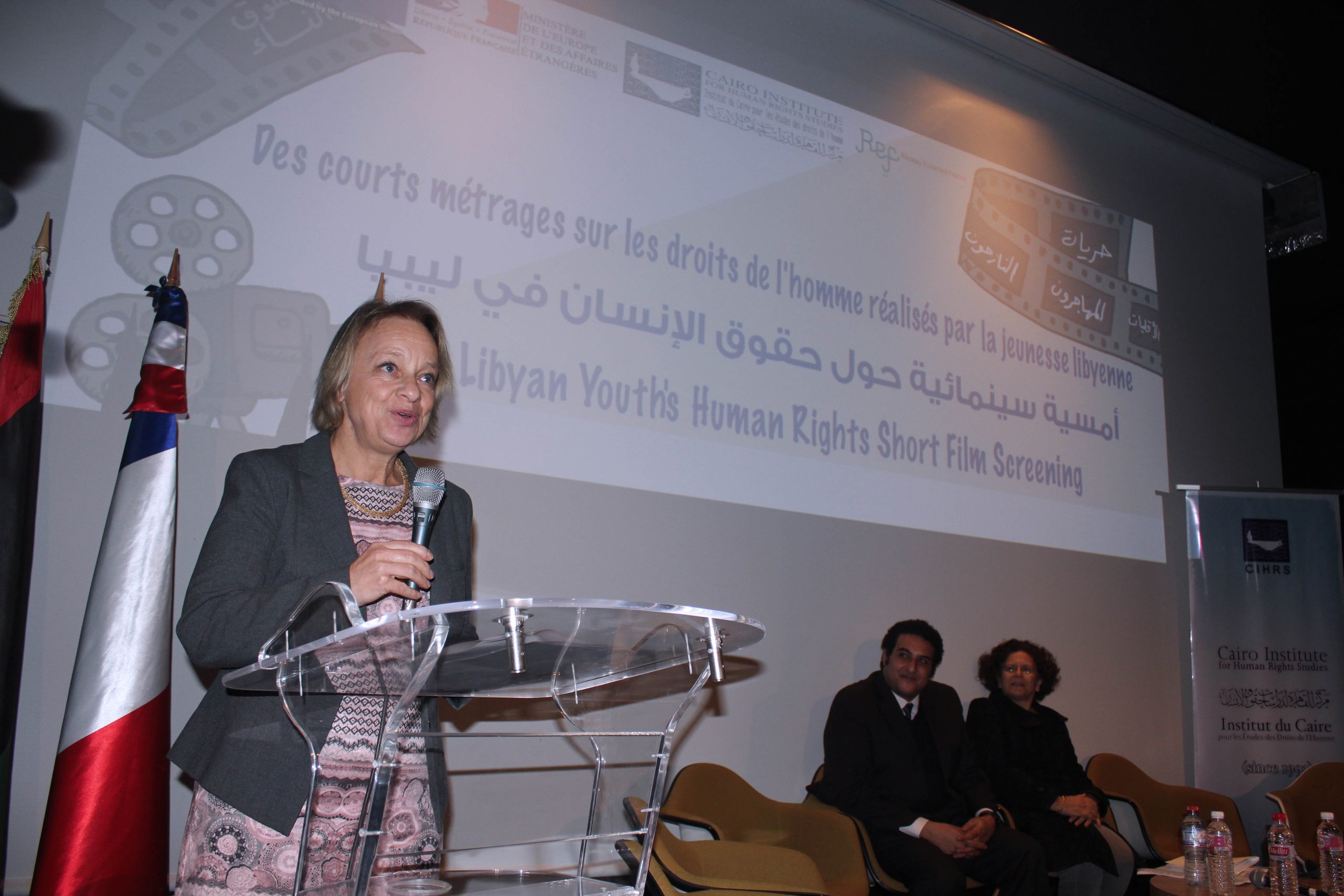
On the occasion of Human Rights Day (10 December), the Cairo Institute for Human Rights Studies (CIHRS) presented a screening today of eight short films depicting human rights struggles and youth’s aspirations in Libya, as part of a project supported by the European Union. The screening and debate with filmmakers took place at the Institut français en Tunisie with the support of the European Union Delegation to Libya, the Institut français de Libye, and Réseau Euromed France (REF).
The films were produced by a group of creative young Libyans who discussed the concrete issues addressed in their films, from freedom of expression to the rights of the child or domestic violence, as well as challenges faced by human rights defenders in Libya. The event was an outcome of the efforts of CIHRS to promote human rights culture through artistic and creative means, with an emphasis on cinema.
Ambassador Bettina Muscheidt, the Head of the Delegation of the European Union, underlined that “Libyans today no longer want to forego their fundamental rights, among them freedom of expression, the right to be treated with dignity, protection against discrimination or arbitrary detention. These short films send a powerful message: collective efforts are needed to defend these rights. Today we also pay tribute to the courage of human rights defenders and the risks they take in upholding values that are simply universal and non-negotiable. The EU strives to further support human rights defenders in Libya.”
“On human rights, inaction is not an option,” declared the Ambassador of France in her address. “You are human rights witnesses and activists, and we pledge to be by your side in this engagement.”
“Respect for human rights is integral to the success of the ongoing political process in Libya,” emphasized Ziad Abdel Tawab, CIHRS Deputy Director. “Culture and the arts is a central element of this screening initiative and is used to reflect the challenges faced by the Libyan people in their painful transition towards democracy. These short movies are dedicated to every individual in Libya who believes in the value of living together in a democracy.”
During their exchange with the audience, the Libyan filmmakers discussed the ability of images from Libya, professionally reproduced and transmitted artistically, to raise awareness about human rights and citizenship. The films delved into major human rights issues faced by vulnerable groups in Libya, and highlighted the vital role of culture in reflecting the obstacles the Libyan people must overcome as they transition towards democracy. Some of the films shown today will be screened in a number of festivals, including the Erato Festival in Tripoli and the Festival Tanwert in Benghazi, and will be available online in 2018 to benefit to the largest possible audience inside and outside Libya.
Background
CIHRS believes that democracy can only be achieved by empowering citizens to freely express themselves without any censorship, to stand up against widespread violence, the absence of the rule of law, and violations of – as well as dangers to – human rights and dignity.
In July 2017, CIHRS launched a competition for creative young Libyans to describe their reality and its challenges through innovative, artistic ways; many ideas and applications – including documentaries, fiction, animation and experimental films – were received. In August 2017, eight projects were selected by a jury composed of CIHRS, REF and an independent consultant. In September and November, CIHRS, with the support of the European Union, organized two workshops in Tunisia on the film industry for the benefit of the selected participants.
These eight films were previously screened in Marseille from 8-16 November during a cultural and artistic workshop organized by Réseau Euromed France in collaboration with CIHRS, the foundations Les Instants Vidéo Numériques et Poétiques and Ligue de l’Enseignement Bouches-du-Rhône, the Ministry for Europe and Foreign Affairs, and the French Agency for Development.
The screening is part of a series of events (Benghazi, Brussels, Geneva, Marseille, Paris, Rome and Tripoli) aimed at showing the real situation and challenges faced by Libyans, together with building bridges of communication for Libyan youth. The initiative is the result of collaboration between CIHRS and members of the Coalition of Libyan Associations (The Platform) and other nascent human rights organizations in Libya.
For more information, please contact: CIHRS; Karim Salem, Libya Researcher: karim@cihrs.org
Share this Post

